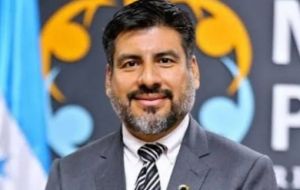MercoPress. South Atlantic News Agency
Foul play in Honduran elections feared
 Zelaya insists the recordings “fully demonstrate the existence of an illicit association” to sabotage the forthcoming elections
Zelaya insists the recordings “fully demonstrate the existence of an illicit association” to sabotage the forthcoming elections The Foreign Affairs Committee of the US House of Representatives has issued a warning regarding the integrity of Honduras' upcoming elections, drawing parallels to institutional abuses detected in Venezuela and Nicaragua.
The Committee claims that the “latest unconstitutional measure by the President Xiomara government to manipulate the elections” is pushing Honduras toward authoritarianism.
The Congressional division targeted Attorney General Johel Zelaya -an ally of President Xiomara Castro-, who allegedly prosecuted judges for validating the election, despite a Supreme Court ruling upholding the magistrates' immunity.
The House's body believes this action sends a clear message that electoral judges who do not “submit to the ruling party will face criminal prosecution.” This perceived institutional abuse could trigger a political and economic crisis, leading to mass migration toward the US southern border and creating “safe havens for drug trafficking networks.”
The Committee announced a hearing on the issue to examine the allegations and their implications for the region and US border security, featuring Honduran Liberal presidential candidate Salvador Nasralla and other opposition leaders, such as deputies Fátima Mena, Maribel Espinoza, and Claudia Ramírez.
US Congresswoman María Elvira Salazar emphasized the alarm over the situation, stating that “Electoral manipulation and institutional abuses follow the same script that destroyed Venezuela and Nicaragua.”
In Tegucigalpa, the Public Prosecutor's Office confirmed the authenticity of audio recordings suggesting a conspiracy by the opposition to delegitimize the Nov. 30 polls.
upcoming general elections scheduled for November 30. There is “certainty about the authenticity of the files” initially disclosed on Oct. 29 by Zelaya, who insists these recordings ”fully demonstrate the existence of an illicit association between a member of the National Electoral Council (CNE), a deputy, and an active member of the Armed Forces” aiming to sabotage the forthcoming elections.
The audio allegedly captures a conversation involving Cossette López, of the right-wing National Party in the CNE; Tomás Zambrano, the party's leader in the National Congress; and an unidentified military officer.
The evidence was provided to the Public Prosecutor's Office by electoral councilor Marlon Ochoa, who represents the ruling Liberty and Refoundation Party (Libre). Ochoa's complaint posits a hypothetical plan by the National and Liberal parties —collectively referred to as the two-party system— to disrupt the elections and engineer a post-election crisis detrimental to the Libre party, which is seeking a second consecutive victory.
The Public Prosecutor's Office specified that an expert analysis of the audio, reportedly conducted by an international company at Libre's request, “is not binding on the investigation being conducted by this institution.” The office confirmed it relies on its own national and international experts and resources for its official inquiry. “Criminal proceedings will be carried out with firmness, objectivity, and independence, ensuring that all those responsible face justice without privileges or considerations,” Zelaya's office pointed out.
Meanwhile, the developing situation prompted an international response, with the United States, Antigua and Barbuda, Argentina, Ecuador, and Paraguay jointly requesting an urgent meeting of the Permanent Council of the Organization of American States (OAS).
The signatory Member States reiterated strong support for the OAS Electoral Observation Mission in Honduras and echoed the risks outlined by the Mission, namely the need for the National Electoral Council to execute its organizational and technical duties independently, free from undue interference or pressure, in accordance with Honduran law.
Additionally, the petitioners urged all relevant Honduran authorities, including electoral bodies, judicial bodies, and the Armed Forces, to operate “scrupulously and faithfully within the constitutional and legal framework of Honduras” to guarantee the integrity of the electoral process and safeguard the personal safety of election officials.




Top Comments
Disclaimer & comment rulesCommenting for this story is now closed.
If you have a Facebook account, become a fan and comment on our Facebook Page!